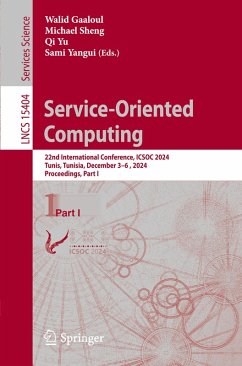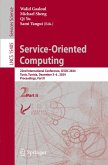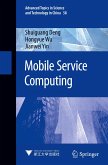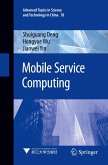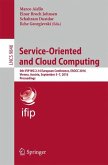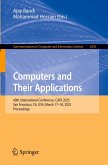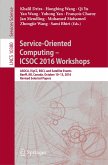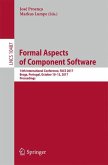Service-Oriented Computing
22nd International Conference, ICSOC 2024, Tunis, Tunisia, December 3-6, 2024, Proceedings, Part I
Herausgegeben:Gaaloul, Walid; Sheng, Michael; Yu, Qi; Yangui, Sami
Service-Oriented Computing
22nd International Conference, ICSOC 2024, Tunis, Tunisia, December 3-6, 2024, Proceedings, Part I
Herausgegeben:Gaaloul, Walid; Sheng, Michael; Yu, Qi; Yangui, Sami
- Broschiertes Buch
- Merkliste
- Auf die Merkliste
- Bewerten Bewerten
- Teilen
- Produkt teilen
- Produkterinnerung
- Produkterinnerung
The two-volume set LNCS 15404 and 15405 constitutes the refereed proceedings of the 22nd International Conference on Service-Oriented Computing, ICSOC 2024, held in Tunis, Tunisia, during December 3-6, 2024.
The 38 full papers and 19 short papers presented in these proceedings were carefully reviewed and selected from 255 submissions. The papers are organized in the following topical sections:
Part I: Edge and IoT; Generative AI; Service Security and Privacy; and Processes and Workflows.
Part II: Cloud Computing; QoS and SLA; Microservice; Service Recommendation; Emerging Technologies…mehr
Andere Kunden interessierten sich auch für
![Service-Oriented Computing Service-Oriented Computing]() Service-Oriented Computing50,99 €
Service-Oriented Computing50,99 €![Mobile Service Computing Mobile Service Computing]() Shuiguang DengMobile Service Computing129,99 €
Shuiguang DengMobile Service Computing129,99 €![Mobile Service Computing Mobile Service Computing]() Shuiguang DengMobile Service Computing129,99 €
Shuiguang DengMobile Service Computing129,99 €![Service-Oriented and Cloud Computing Service-Oriented and Cloud Computing]() Service-Oriented and Cloud Computing38,99 €
Service-Oriented and Cloud Computing38,99 €![Computers and Their Applications Computers and Their Applications]() Computers and Their Applications57,99 €
Computers and Their Applications57,99 €![Service-Oriented Computing - ICSOC 2016 Workshops Service-Oriented Computing - ICSOC 2016 Workshops]() Service-Oriented Computing - ICSOC 2016 Workshops38,99 €
Service-Oriented Computing - ICSOC 2016 Workshops38,99 €![Formal Aspects of Component Software Formal Aspects of Component Software]() Formal Aspects of Component Software38,99 €
Formal Aspects of Component Software38,99 €-
-
-
The two-volume set LNCS 15404 and 15405 constitutes the refereed proceedings of the 22nd International Conference on Service-Oriented Computing, ICSOC 2024, held in Tunis, Tunisia, during December 3-6, 2024.
The 38 full papers and 19 short papers presented in these proceedings were carefully reviewed and selected from 255 submissions. The papers are organized in the following topical sections:
Part I: Edge and IoT; Generative AI; Service Security and Privacy; and Processes and Workflows.
Part II: Cloud Computing; QoS and SLA; Microservice; Service Recommendation; Emerging Technologies and Approaches; Service Composition; Blockchain; and Industry Papers.
The 38 full papers and 19 short papers presented in these proceedings were carefully reviewed and selected from 255 submissions. The papers are organized in the following topical sections:
Part I: Edge and IoT; Generative AI; Service Security and Privacy; and Processes and Workflows.
Part II: Cloud Computing; QoS and SLA; Microservice; Service Recommendation; Emerging Technologies and Approaches; Service Composition; Blockchain; and Industry Papers.
Produktdetails
- Produktdetails
- Lecture Notes in Computer Science 15404
- Verlag: Springer / Springer Nature Singapore / Springer, Berlin
- Artikelnr. des Verlages: 978-981-96-0804-1
- Seitenzahl: 424
- Erscheinungstermin: 7. Dezember 2024
- Englisch
- Abmessung: 235mm x 155mm x 23mm
- Gewicht: 634g
- ISBN-13: 9789819608041
- ISBN-10: 981960804X
- Artikelnr.: 72063282
- Herstellerkennzeichnung
- Springer-Verlag KG
- Sachsenplatz 4-6
- 1201 Wien, AT
- ProductSafety@springernature.com
- Lecture Notes in Computer Science 15404
- Verlag: Springer / Springer Nature Singapore / Springer, Berlin
- Artikelnr. des Verlages: 978-981-96-0804-1
- Seitenzahl: 424
- Erscheinungstermin: 7. Dezember 2024
- Englisch
- Abmessung: 235mm x 155mm x 23mm
- Gewicht: 634g
- ISBN-13: 9789819608041
- ISBN-10: 981960804X
- Artikelnr.: 72063282
- Herstellerkennzeichnung
- Springer-Verlag KG
- Sachsenplatz 4-6
- 1201 Wien, AT
- ProductSafety@springernature.com
.- Edge and IoT.
.- Efficient and Dependency-aware Placement of Serverless Functions on Edge Infrastructures.
.- POSEIDON: Efficient Function Placement at the Edge using Deep Reinforcement Learning.
.- ABBA-VSM: Time Series Classification using Symbolic Representation on the Edge.
.- An Energy-Efficient Partition and Offloading Method for Multi-DNN Applications in Edge-End Collaboration Environments.
.- Crowdsourcing Task Assignment with Category and Mobile Combined Preference Learning.
.- Federated Learning as a Service for Hierarchical Edge Networks with Heterogeneous Models.
.- Optimizing Traffic Allocation for Multi-Replica Microservice Deployments in Edge Cloud.
.- An Event-B Based Approach for Horizontally Scalable IoT Applications.
.- Efficient Provisioning of IoT Energy Services.
.- Attention-driven Conflict Management in Smart IoT-based Systems.
.- Benchmarking Deep Learning Models for Object Detection on Edge Computing Devices.
.- Generative AI.
.- LLM Enhanced Representation For Cold Start Service Recommendation.
.- Combining Generative AI and PPTalk Service Specification for Dynamic and Adaptive Task-Oriented Chatbots.
.- Automated Generation of BPMN Processes from Textual Requirements.
.- Plug-and-Play Performance Estimation for LLM Services without Relying on Labeled Data.
.- UELLM: A Unified and Efficient Approach for Large Language Model Inference Serving.
.- Service-Oriented Requirements Elicitation Through Systematic Questionnaire Design: A Problem-Driven GenAI Approach.
.- Assessing Large Language Models Effectiveness in Outdated Method Renaming.
.- Service Security and Privacy.
.- DynaEDI: Decentralized Integrity Verification for Dynamic Edge Data.
.- Heterogeneous Multi Relation Trust for SIoT Service Recommendation.
.- A Context-Aware Service Framework for Detecting Fake Images.
.- Bias Exposed: The BiaXposer Framework for NLP Fairness.
.- FlowShredder: Protocol-Independent In-Network Encryption for Rich Media Traffic.
.- Processes and workflows.
.- HiGPP: A History-informed Graph-based Process Predictor for Next Activity.
.- From Visual Choreographies to Flexible Information Protocols.
.- Architectural Elements of decentralized Process Management Systems.
.- LLM-based Business Process Documentation Generation.
.- Efficient and Dependency-aware Placement of Serverless Functions on Edge Infrastructures.
.- POSEIDON: Efficient Function Placement at the Edge using Deep Reinforcement Learning.
.- ABBA-VSM: Time Series Classification using Symbolic Representation on the Edge.
.- An Energy-Efficient Partition and Offloading Method for Multi-DNN Applications in Edge-End Collaboration Environments.
.- Crowdsourcing Task Assignment with Category and Mobile Combined Preference Learning.
.- Federated Learning as a Service for Hierarchical Edge Networks with Heterogeneous Models.
.- Optimizing Traffic Allocation for Multi-Replica Microservice Deployments in Edge Cloud.
.- An Event-B Based Approach for Horizontally Scalable IoT Applications.
.- Efficient Provisioning of IoT Energy Services.
.- Attention-driven Conflict Management in Smart IoT-based Systems.
.- Benchmarking Deep Learning Models for Object Detection on Edge Computing Devices.
.- Generative AI.
.- LLM Enhanced Representation For Cold Start Service Recommendation.
.- Combining Generative AI and PPTalk Service Specification for Dynamic and Adaptive Task-Oriented Chatbots.
.- Automated Generation of BPMN Processes from Textual Requirements.
.- Plug-and-Play Performance Estimation for LLM Services without Relying on Labeled Data.
.- UELLM: A Unified and Efficient Approach for Large Language Model Inference Serving.
.- Service-Oriented Requirements Elicitation Through Systematic Questionnaire Design: A Problem-Driven GenAI Approach.
.- Assessing Large Language Models Effectiveness in Outdated Method Renaming.
.- Service Security and Privacy.
.- DynaEDI: Decentralized Integrity Verification for Dynamic Edge Data.
.- Heterogeneous Multi Relation Trust for SIoT Service Recommendation.
.- A Context-Aware Service Framework for Detecting Fake Images.
.- Bias Exposed: The BiaXposer Framework for NLP Fairness.
.- FlowShredder: Protocol-Independent In-Network Encryption for Rich Media Traffic.
.- Processes and workflows.
.- HiGPP: A History-informed Graph-based Process Predictor for Next Activity.
.- From Visual Choreographies to Flexible Information Protocols.
.- Architectural Elements of decentralized Process Management Systems.
.- LLM-based Business Process Documentation Generation.
.- Edge and IoT.
.- Efficient and Dependency-aware Placement of Serverless Functions on Edge Infrastructures.
.- POSEIDON: Efficient Function Placement at the Edge using Deep Reinforcement Learning.
.- ABBA-VSM: Time Series Classification using Symbolic Representation on the Edge.
.- An Energy-Efficient Partition and Offloading Method for Multi-DNN Applications in Edge-End Collaboration Environments.
.- Crowdsourcing Task Assignment with Category and Mobile Combined Preference Learning.
.- Federated Learning as a Service for Hierarchical Edge Networks with Heterogeneous Models.
.- Optimizing Traffic Allocation for Multi-Replica Microservice Deployments in Edge Cloud.
.- An Event-B Based Approach for Horizontally Scalable IoT Applications.
.- Efficient Provisioning of IoT Energy Services.
.- Attention-driven Conflict Management in Smart IoT-based Systems.
.- Benchmarking Deep Learning Models for Object Detection on Edge Computing Devices.
.- Generative AI.
.- LLM Enhanced Representation For Cold Start Service Recommendation.
.- Combining Generative AI and PPTalk Service Specification for Dynamic and Adaptive Task-Oriented Chatbots.
.- Automated Generation of BPMN Processes from Textual Requirements.
.- Plug-and-Play Performance Estimation for LLM Services without Relying on Labeled Data.
.- UELLM: A Unified and Efficient Approach for Large Language Model Inference Serving.
.- Service-Oriented Requirements Elicitation Through Systematic Questionnaire Design: A Problem-Driven GenAI Approach.
.- Assessing Large Language Models Effectiveness in Outdated Method Renaming.
.- Service Security and Privacy.
.- DynaEDI: Decentralized Integrity Verification for Dynamic Edge Data.
.- Heterogeneous Multi Relation Trust for SIoT Service Recommendation.
.- A Context-Aware Service Framework for Detecting Fake Images.
.- Bias Exposed: The BiaXposer Framework for NLP Fairness.
.- FlowShredder: Protocol-Independent In-Network Encryption for Rich Media Traffic.
.- Processes and workflows.
.- HiGPP: A History-informed Graph-based Process Predictor for Next Activity.
.- From Visual Choreographies to Flexible Information Protocols.
.- Architectural Elements of decentralized Process Management Systems.
.- LLM-based Business Process Documentation Generation.
.- Efficient and Dependency-aware Placement of Serverless Functions on Edge Infrastructures.
.- POSEIDON: Efficient Function Placement at the Edge using Deep Reinforcement Learning.
.- ABBA-VSM: Time Series Classification using Symbolic Representation on the Edge.
.- An Energy-Efficient Partition and Offloading Method for Multi-DNN Applications in Edge-End Collaboration Environments.
.- Crowdsourcing Task Assignment with Category and Mobile Combined Preference Learning.
.- Federated Learning as a Service for Hierarchical Edge Networks with Heterogeneous Models.
.- Optimizing Traffic Allocation for Multi-Replica Microservice Deployments in Edge Cloud.
.- An Event-B Based Approach for Horizontally Scalable IoT Applications.
.- Efficient Provisioning of IoT Energy Services.
.- Attention-driven Conflict Management in Smart IoT-based Systems.
.- Benchmarking Deep Learning Models for Object Detection on Edge Computing Devices.
.- Generative AI.
.- LLM Enhanced Representation For Cold Start Service Recommendation.
.- Combining Generative AI and PPTalk Service Specification for Dynamic and Adaptive Task-Oriented Chatbots.
.- Automated Generation of BPMN Processes from Textual Requirements.
.- Plug-and-Play Performance Estimation for LLM Services without Relying on Labeled Data.
.- UELLM: A Unified and Efficient Approach for Large Language Model Inference Serving.
.- Service-Oriented Requirements Elicitation Through Systematic Questionnaire Design: A Problem-Driven GenAI Approach.
.- Assessing Large Language Models Effectiveness in Outdated Method Renaming.
.- Service Security and Privacy.
.- DynaEDI: Decentralized Integrity Verification for Dynamic Edge Data.
.- Heterogeneous Multi Relation Trust for SIoT Service Recommendation.
.- A Context-Aware Service Framework for Detecting Fake Images.
.- Bias Exposed: The BiaXposer Framework for NLP Fairness.
.- FlowShredder: Protocol-Independent In-Network Encryption for Rich Media Traffic.
.- Processes and workflows.
.- HiGPP: A History-informed Graph-based Process Predictor for Next Activity.
.- From Visual Choreographies to Flexible Information Protocols.
.- Architectural Elements of decentralized Process Management Systems.
.- LLM-based Business Process Documentation Generation.

